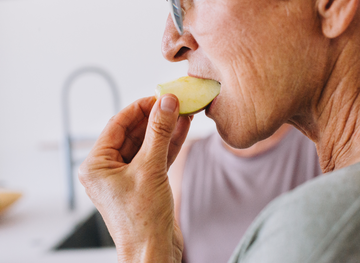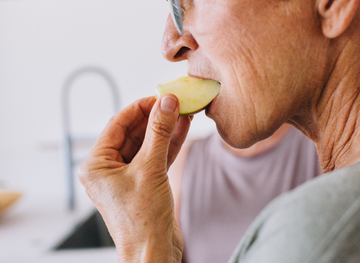Monsoon Nutrition for Senior Citizens: Eating Right for Immunity, Comfort & Wellness
Jul 08, 2025

The monsoon season brings with it cool breezes, lush greenery, and much-needed relief from the scorching heat. But for senior citizens, this time of year can also increase health risks — especially related to digestion, immunity, and hydration. Aging bodies are more vulnerable to infections, waterborne illnesses, and food sensitivities, making it crucial to follow a tailored nutritional plan during the rainy season.
At SorezeCare, we believe in promoting not just elder skin health but also complete well-being. Nutrition plays a vital role in ensuring that our elders stay healthy, active, and comfortable throughout the year. Here's a detailed guide on what senior citizens should eat (and avoid) during the monsoon, along with essential lifestyle tips to stay well and thrive.
Why Monsoon Nutrition Matters for Seniors
As we age, our immune system weakens, and digestive efficiency slows down. Add the damp, humid conditions of the monsoon — which foster bacterial growth and increase the risk of waterborne diseases — and you have a perfect storm that can affect the elderly’s health significantly.
Key focus areas during monsoon nutrition should be:
-
Boosting immunity
-
Supporting digestion
-
Staying properly hydrated
-
Preventing foodborne illnesses
A carefully planned diet, combined with simple health and hygiene practices, can help protect seniors from seasonal health challenges.
What to Eat: Nourishing Foods for Monsoon Wellness
Here’s a list of foods that are both safe and beneficial for senior citizens during the rainy season:
Fresh Fruits and Vegetables
Choose seasonal and local produce to ensure maximum freshness and nutrition. Fruits like apples, pears, pomegranates, and papayas are rich in antioxidants and vitamins. These support digestion and boost immunity.
Vegetables such as bottle gourd (lauki), ridge gourd (turai), spinach, and cooked leafy greens are light on the stomach, fibrous, and hydrating. Always ensure they are thoroughly washed and well-cooked to kill any harmful microbes.
Warm Soups and Stews
Soups made with vegetables, lentils, or chicken provide a comforting, easy-to-digest meal option. They offer warmth and hydration while being nutrient-rich — ideal for aging digestive systems.
Herbal Teas
Ginger, tulsi (holy basil), and chamomile teas are perfect monsoon companions. These natural infusions help soothe the digestive tract, reduce inflammation, and boost overall immunity. Warm teas also support hydration without the downsides of caffeinated drinks.

Whole Grains
Replace refined grains with brown rice, millets (like jowar, bajra), oats, and whole wheat. These are energy-rich and fiber-filled, promoting sustained energy release and better digestion.
Dry Fruits and Nuts
Almonds, walnuts, dates, and prunes are excellent mid-day snacks. They’re packed with antioxidants, healthy fats, and are known to improve brain and heart health. A handful a day can go a long way!
Spices with Benefits
Don’t underestimate your kitchen spices! Turmeric, ginger, garlic, cumin, and black pepper possess powerful anti-inflammatory, antibacterial, and digestive properties. Use them generously in everyday cooking to improve taste and health.
Foods to Avoid During Monsoon
Avoiding certain foods can significantly reduce the risk of infections and digestive issues for seniors.
Street Foods
They may be tempting, but chaats, pakoras, and other roadside treats are often made in unhygienic environments. The risk of foodborne bacteria is high.
Raw Salads
Raw vegetables, especially if not cleaned properly, can carry germs and waterborne pathogens. Choose steamed or sautéed versions instead.
Fried Foods
These are heavy on the digestive system, can cause acidity and bloating, and may worsen existing heart or cholesterol conditions in elderly individuals.
Sugary and Caffeinated Beverages
High sugar and caffeine intake can lead to dehydration, disrupted sleep, and blood sugar spikes. Replace with warm water, herbal teas, or light homemade drinks.
Other Important Monsoon Wellness Tips for Seniors
Stay Hydrated – Warm is Best
Senior citizens often don’t feel thirsty, leading to unintentional dehydration. Please encourage them to sip on warm water regularly. It aids digestion and flushes out toxins more effectively.
Prioritize Hygiene
Cleanliness is key in preventing infections. Wash fruits and vegetables well, store foods properly, and keep cooking and dining areas clean.
Favor Home-Cooked Meals
Home-cooked food is not just safer, it’s also emotionally comforting. Avoid processed or restaurant meals, especially during the rainy season.
Keep Moving
Even light stretches, chair yoga, or a 15-minute walk indoors can help maintain circulation, joint health, and mood — especially when the weather is gloomy.
Consult a Doctor or Dietitian
If the elder in your care has chronic conditions like diabetes, blood pressure issues, or digestive ailments, always consult a medical professional before changing their diet.
Conclusion: Eating Right is the First Step to Monsoon Wellbeing
Nutrition is a powerful tool — especially for seniors. With a little planning and attention, this monsoon can be a season of good health, joy, and rejuvenation. A diet that includes seasonal, warm, and easily digestible foods, paired with proper hygiene and hydration, will go a long way in protecting the health of our elders.
At SorezeCare, we’re committed to enhancing the quality of life for seniors through not just skin protection, but holistic wellbeing. Because every season deserves to be lived fully — without discomfort or worry.


